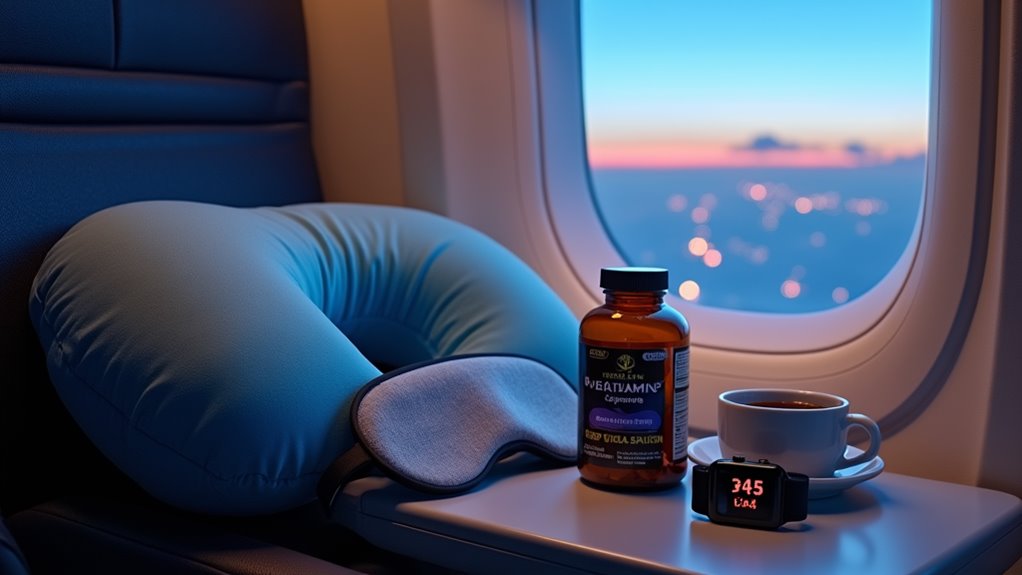To combat jet lag and maintain energy when crossing time zones, you'll want to start adjusting your sleep schedule several days before travel. Gradually shift your bedtime by 30 minutes daily to match your destination's time zone. During your journey, stay hydrated and time your light exposure strategically – seek morning sun when traveling east and evening light when heading west. Pack an eye mask and earplugs for quality rest, and incorporate protein-rich breakfasts with light exercise upon arrival. Combining these approaches with smart meal timing and regular movement will help your body clock adjust more smoothly to your new time zone.
Key Takeaways
- Gradually adjust sleep schedule before travel by shifting 30 minutes daily toward destination time zone for smoother transition.
- Seek morning sunlight when traveling east and evening light when heading west to reset circadian rhythms effectively.
- Stay hydrated with 8 ounces of water hourly during flights while avoiding caffeine and alcohol.
- Exercise in the morning at your destination to boost energy levels and regulate sleep-wake cycles.
- Take a 30-minute outdoor walk upon arrival to benefit from natural light and accelerate time zone adaptation.
Understanding Your Body Clock

While every person's internal clock operates slightly differently, your body naturally follows a 24-hour cycle called the circadian rhythm. This internal timekeeper regulates your sleep-wake patterns, hormone production, and body temperature based on environmental cues like sunlight and darkness.
Your circadian rhythm affects when you feel alert or sleepy throughout the day. It's synchronized with your local time zone through exposure to natural light and daily routines. When you travel across multiple time zones, this rhythm gets disrupted, leading to jet lag symptoms like fatigue, insomnia, and difficulty concentrating.
Understanding how your body clock works is crucial for managing jet lag effectively. You'll need to help your internal clock adjust to the new time zone by strategically timing your exposure to light and darkness.
Pre-Flight Preparation Strategies
Before embarking on your journey across time zones, you can take several steps to minimize jet lag's impact on your body.
Start adjusting your sleep schedule gradually, shifting it by 30 minutes each day toward your destination's time zone. This process should begin about a week before departure.
Make sure you're well-rested before your flight by getting quality sleep the night before.
You'll also want to stay hydrated and limit caffeine and alcohol consumption in the days leading up to travel.
Pack sleep essentials like an eye mask and earplugs to help maintain good sleep habits during your journey.
Consider scheduling your arrival during daylight hours at your destination, as natural light exposure will help reset your internal clock more effectively.
Light Exposure Techniques

You'll find that strategic light exposure is one of the most powerful ways to reset your body clock when crossing time zones.
By timing your exposure to bright light in the morning or evening based on your travel direction, you can help your circadian rhythm adjust more quickly to the new time zone.
Using bright light therapy lamps or seeking natural sunlight at the right intensity can strengthen these timing effects and speed up your adaptation.
Strategic Light Timing
Since light exposure plays a crucial role in regulating your internal body clock, timing your exposure strategically can help minimize jet lag symptoms.
When traveling east, you'll want to seek bright light in the morning hours of your new time zone while avoiding it in the evening. For westward travel, do the opposite – expose yourself to light in the evening and limit morning light exposure.
If you're crossing multiple time zones, start adjusting your light exposure pattern a few days before departure. You can use artificial light sources like light therapy boxes when natural sunlight isn't available.
Remember to consider the season and daylight hours at your destination when planning your exposure schedule. For maximum effectiveness, combine strategic light timing with other jet lag management techniques like adjusted meal times and sleep schedules.
Light Intensity Methods
While adjusting to a new time zone, the intensity of light exposure matters as much as its timing.
You'll need bright light (at least 2,500 lux) to effectively reset your body clock, which you can get from natural sunlight or light therapy devices.
For maximum benefit, use a 10,000-lux light box at arm's length for 15-30 minutes.
During periods when you want to minimize light exposure, wear blue-light blocking glasses or keep your environment dim (below 50 lux).
This is particularly important in the evening hours of your new time zone.
You can also control light intensity by adjusting the distance between yourself and your light source – moving closer increases exposure, while moving away reduces it.
Sleep Schedule Adjustment Tips
You'll want to start adjusting your sleep schedule several days before your trip by shifting your bedtime 15-30 minutes closer to your destination's time each night.
When you're planning these gradual shifts, be strategic about your exposure to natural and artificial light, as it plays a crucial role in resetting your body clock.
During this adjustment period, you can use smart lighting in your home to simulate sunrise and sunset times at your destination.
Gradual Time Shifts Begin
To combat jet lag before your trip, begin adjusting your sleep schedule several days in advance. If you're traveling east, start going to bed one hour earlier each night and wake up one hour earlier each morning.
For westward travel, do the opposite by staying up an hour later and waking up an hour later.
Make these adjustments gradually over 3-4 days before departure. During this transition, you'll want to shift your meals and daily activities to match your new schedule.
If you're heading to a destination that's more than three time zones away, you might need to start these changes up to a week before departure.
This preparation will help your body's internal clock align more closely with your destination's time zone.
Smart Light Exposure Planning
Because light exposure significantly influences your circadian rhythm, planning when you receive or avoid light can help reset your body clock.
When traveling east, you'll need morning light exposure at your destination and should avoid evening light. For westward travel, seek evening light and limit morning exposure.
You can manipulate light exposure using natural sunlight or a bright light therapy lamp. Wear sunglasses when you need to avoid light, especially during the hours your body should be winding down.
If you're crossing multiple time zones, start adjusting your light exposure patterns a few days before departure. Download a jet lag calculator app to determine your optimal light exposure schedule based on your travel direction and time zones crossed.
Eating and Hydration Guidelines

Maintaining proper eating habits and hydration is crucial for minimizing jet lag's impact on your body. During travel, you'll want to adjust your meal times gradually to match your destination's schedule. Start this transition a few days before departure by shifting meals closer to your target time zone's eating patterns.
Stay hydrated by drinking water regularly throughout your flight, aiming for 8 ounces every hour you're airborne. You should avoid alcohol and caffeine, as they can disrupt your sleep cycle and dehydrate you further.
When you arrive, eat protein-rich foods for breakfast to boost alertness, and choose carbohydrate-heavy meals for dinner to help induce sleep. Don't skip meals, as this can worsen jet lag symptoms and make it harder for your body to adapt.
Natural Supplements and Remedies
Beyond food and drink choices, several natural supplements and remedies can help your body overcome jet lag.
Melatonin supplements, taken at your target destination's bedtime, can regulate your sleep-wake cycle. You'll find that valerian root and lavender essential oils promote relaxation and better sleep quality.
Consider trying adaptogenic herbs like ginseng and ashwagandha to boost energy levels and reduce travel stress. A vitamin B complex supplement can support your body's natural energy production and help maintain alertness during the day.
If you prefer homeopathic options, No-Jet-Lag tablets contain natural ingredients like wild chamomile and leopard's bane. You can also try acupressure wristbands, which may alleviate nausea and help restore your body's natural rhythms while traveling across time zones.
Exercise and Movement Methods

While your body adjusts to a new time zone, strategic exercise can help reset your internal clock. If you've arrived at your destination during daylight hours, try a 30-minute walk outside. The combination of physical activity and natural light signals your brain to stay alert and adapt to the local schedule.
Don't exercise within three hours of bedtime, as this can disrupt your sleep cycle. Instead, plan morning workouts to energize your day and regulate your circadian rhythm.
Light stretching or yoga can help reduce muscle tension from long flights and promote blood circulation. If you're feeling sluggish during the afternoon slump, take a brief walk or do simple exercises like shoulder rolls and ankle rotations at your desk to maintain energy levels.
Frequently Asked Questions
Can Jet Lag Affect My Long-Term Health if I Travel Frequently?
Frequent jet lag can impact your long-term health if you don't manage it properly.
You'll risk disrupting your circadian rhythm, which can lead to sleep disorders, digestive issues, and mood changes.
Research shows chronic jet lag might weaken your immune system and increase stress hormones.
It's also linked to cognitive decline and potential cardiovascular problems.
However, you can minimize these risks with proper sleep habits and travel planning.
How Long Does It Take Children to Recover From Jet Lag?
Children typically adjust to jet lag faster than adults, usually taking about half a day per time zone crossed.
Your child might recover in 3-4 days after crossing 6 time zones, though infants and toddlers can take longer due to their rigid sleep schedules.
You'll notice they're back to normal when their sleep patterns, appetite, and mood stabilize.
Every child adapts differently, so don't worry if it takes a bit longer.
Should I Take Different Jet Lag Precautions if I Have Chronic Medical Conditions?
You'd think chronic conditions would make jet lag easier since you're already used to managing health issues – but it's actually the opposite.
You'll need extra precautions. Always consult your doctor before traveling across time zones, as they'll help adjust your medication schedule and provide specific advice.
If you have diabetes, heart conditions, or anxiety disorders, you'll need a tailored plan to manage symptoms during time transitions.
Does Flying North-South Cause the Same Jet Lag as Flying East-West?
You'll experience less jet lag when flying north-south compared to east-west because you're not crossing time zones.
North-south flights may still cause travel fatigue from the journey itself, but they won't disrupt your circadian rhythm like east-west travel does.
While you might feel tired after a long north-south flight, you won't need to adjust your internal body clock to a new time zone.
Can Jet Lag Symptoms Vary Depending on My Age or Gender?
Like a well-worn clock that needs extra care, your body's response to jet lag can indeed vary with age and gender.
As you get older, you'll likely experience more severe symptoms and need additional recovery time.
Women often report stronger jet lag effects, particularly during menstruation or menopause due to hormonal fluctuations.
Your sleep patterns and circadian rhythms become more rigid with age, making it harder for your body to adapt quickly.
Conclusion
Like resetting a complex watch, adjusting your body clock takes patience and precision. You'll find that combining these strategies – from pre-flight preparation to natural supplements – creates your personal jet lag defense system. Research shows that business travelers lose up to 5-7 productive days annually due to jet lag, but you don't have to be part of that statistic. Take control of your time zones, and you'll arrive ready to conquer.

Leave a Reply